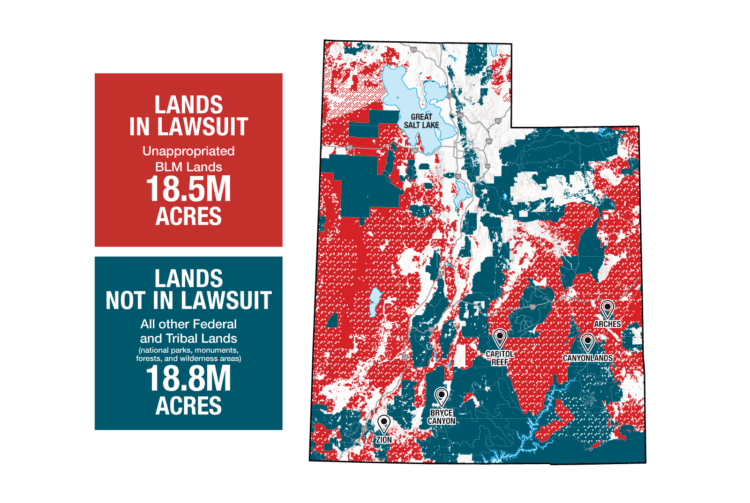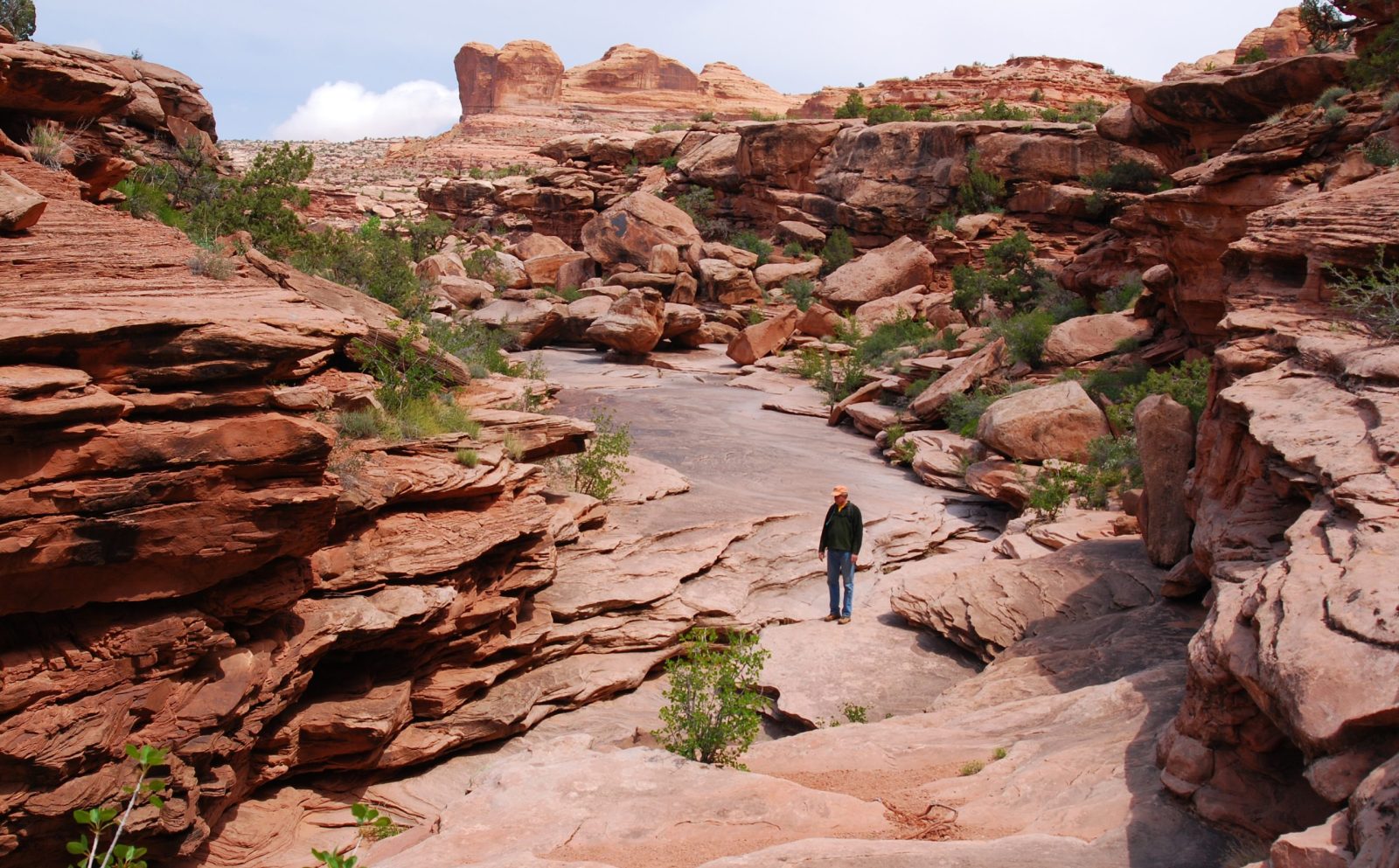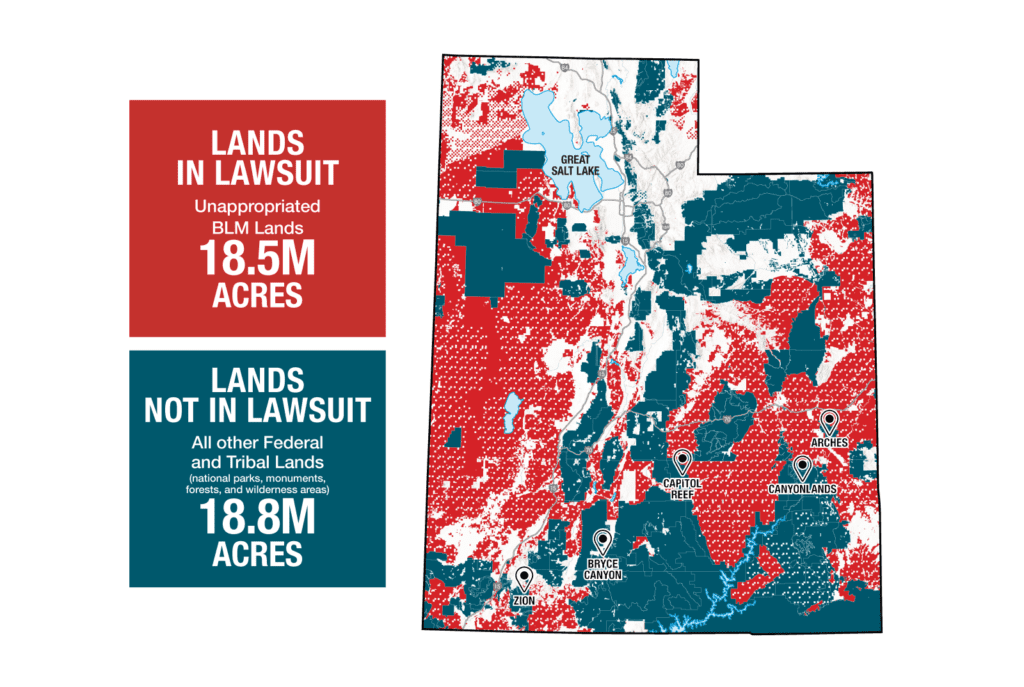On Tuesday, Utah filed a lawsuit, asking the U.S. Supreme Court to determine whether the federal government can retain millions of acres indefinitely – or whether the feds must dispose of those lands.
“It is obvious to all of us that the federal government has increasingly failed to keep our lands accessible and properly managed,” Republican Gov. Spencer J. Cox, said in a press conference. The state is calling the suit a “Stand for Our Land,” saying the feds are restricting access with recent decisions such as the Public Lands Rule and an updated travel management plan near Moab.
Conservation groups quickly responded. “Governor Cox and the state legislature need to make a U-turn before they waste millions of taxpayer dollars enriching out-of-state lawyers on this pointless lawsuit,” said Aaron Weiss, deputy director of Center for Western Priorities, a nonpartisan, conservation advocacy group focusing on public-land protection.
 This map, provided by the state of Utah, depicts what it considers “unappropriated lands.” Credit: State of Utah
This map, provided by the state of Utah, depicts what it considers “unappropriated lands.” Credit: State of Utah
The case, State of Utah v. United States, brings into question 18.5 million acres of what the state is calling “unappropriated” lands — essentially lands Congress hasn’t set aside for a specific purpose — that are managed by the Bureau of Land Management across Utah. This includes frequently visited recreation destinations such as Fisher Towers and Desolation Canyon. The case excludes “appropriated” lands, such as national parks, national monuments, wilderness areas and tribal lands. If the Supreme Court agrees to hear the case, and if Utah wins, the federal government could be forced to dispose of over 200 million acres of public lands, Steve Bloch, legal director of Southern Utah Wilderness Alliance, told High Country News.
The state argues that it has been deprived of its “sovereign powers,” but legal experts and conservation groups question whether it has a case.
The federal government controls nearly 70% of land in Utah, in comparison to eastern states where that number is closer to 1-3%. “Nothing in the text of the Constitution authorizes such an inequitable practice or relationship,” said Utah Attorney General Sean Reyes.
The lawsuit concerns the property clause of the U.S. Constitution, which grants Congress power to dispose of and make regulations regarding all territory of the U.S.
 Goldbar Canyon, near Moab, Utah, could be affected by a lawsuit that the state of Utah brought to the U.S. Supreme Court this week. Credit: Ray Bloxham/Southern Utah Wilderness Alliance
Goldbar Canyon, near Moab, Utah, could be affected by a lawsuit that the state of Utah brought to the U.S. Supreme Court this week. Credit: Ray Bloxham/Southern Utah Wilderness Alliance
“There’s pretty solid case law going back a very long time that says Congress has the authority over public lands,” said John Ruple, University of Utah law professor, indicating that the federal government can hold on to the land in question.
However, the current Supreme Court recently overturned legal precedent, reversing notable decisions such as Roe v. Wade and the Chevron doctrine.
“That’s definitely a motivating factor for this filing to see if they can attract the attention of this ultra-conservative and activist Supreme Court,” said Bloch.
If Utah prevails, Cox insisted that “public lands will stay in public hands” at the press conference on Tuesday. He said, “We are not trying to take this land away. We’re not trying to privatize this land.”
The Utah Department of Land Management, created by the Utah Legislature in 2017 to be staffed when the state receives at least 250,000 acres from the feds, would oversee the transferred land.
However, even if the Supreme Court rules in Utah’s favor, it’s not a guarantee that the federal land will simply be transferred to the state. “I think a strong argument can be made that the federal government has the discretion over how to dispose of those lands, whether it’s by sale, lease, grant or otherwise,” Ruple said.
A video shared at the start of a press conference on Tuesday to announce the lawsuit and launch Utah’s “Stand for Our Land” campaign.
This lawsuit is a long time coming. Ruple told High Country News that this is “the latest chapter in the Sagebrush Rebellion,” a revolt against federal landownership that arose in the 1970s after the passing of laws such as the Federal Land Policy and Management Act.
According to the Utah Attorney General’s office, this lawsuit comes “after decades of legal analysis.” Utah has also passed legislation in attempt to transfer public lands — unsuccessfully — and prepare to manage formerly federal lands if it succeeds.
Brooke Larsen is a correspondent for High Country News and a freelance journalist writing from Salt Lake City, Utah. Formerly, Brooke was the Virginia Spencer Davis Fellow for HCN.
Spread the word. News organizations can pick-up quality news, essays and feature stories for free.
Republish This Story
![]()
Republish our articles for free, online or in print, under a Creative Commons license.
Source link : http://www.bing.com/news/apiclick.aspx?ref=FexRss&aid=&tid=66c8ff832f934270b679cd2756ff9f8d&url=https%3A%2F%2Fwww.hcn.org%2Farticles%2Fwhy-utah-is-suing-the-u-s-for-control-of-public-land%2F&c=4093556659377188566&mkt=en-us
Author :
Publish date : 2024-08-22 12:59:00
Copyright for syndicated content belongs to the linked Source.
